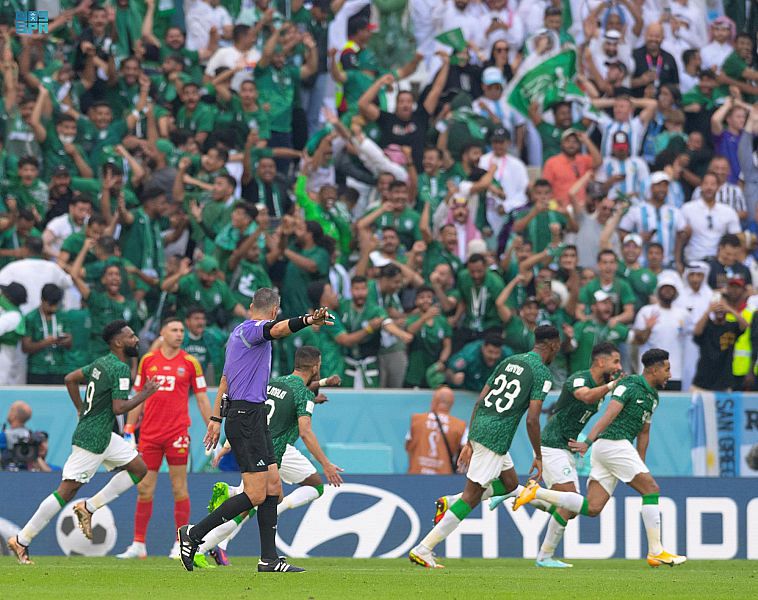
As a competitive Qatar 2022 group stage ends, Arab News looks at why expansion in four years’ time might backfire
LONDON: Competitive teams. Fair, hard-fought competition with no chance of blow-out scorelines or one-sided matches. A gripped, captivated global viewership of billions.
For the latest updates, follow us on Twitter @ArabNewsSport
It is the “Holy Grail trifecta” for sport governing bodies the world over in their quest for audiences, viewing figures and lucrative sponsporships. And, even with all their arrogance and bravado, especially for the most powerful of the lot — FIFA.
Finally, in the ongoing World Cup in Qatar, as the group stage closes and the high-drama of knockout football gets underway, the FIFA bigwigs might have finally found a winning formula.
But, in true FIFA fashion, in four years’ time the governing body will be throwing the baby out with the bathwater and tinkering, fine-tuning and meddling at the most inopportune moment.
The 1998 tournament in France was the first to feature the now-established 32-team format that fans have grown to know, love and plan their lives around for the quadrennial six-week run of a FIFA World Cup.
Eyebrows were raised back then. Even more so as Spain thumped Bulgaria, Netherlands hammered South Korea and Argentina dismantled Jamaica. Letting in the so-called “also-rans” was watering down the tournament, reducing the quality and cheapening the product, said the naysayers.
“24-team tournaments just work,” they bemoaned. “Look at the quality of the European Championship (at the time an intense, high-drama 16-team battle to be continental champions),” they cried. “The smaller teams will just devalue the competition,” they howled.
But, FIFA stuck to its guns and in the ensuing two decades since has produced three World Cups arguably very near the top of most people’s lists of “favorite World Cups,” especially within the big-spending, sought after millennial generation. Germany’s fiesta of football in 2006 stands out for this writer, in particular.
Of course, the mathematical, logical argument of 32 going into 16 was also a major factor in FIFA’s decision-making. Long gone were the complicated best-third-placed teams equations to work out and unfair criteria of tournaments past. It was now a case of: “Finish in the top 16 spots, you progress.”
And so, 24 years on from France’s shock triumph over Brazil in a home tournament, the benefits are being reaped in the Middle East.
We have seen one of the most memorable group stages of a World Cup in living memory in Qatar. Saudi Arabia beating Argentina, Japan toppling Germany, Morocco looking like world-beaters on their way to topping their group, more Asian teams in the Round of 16 than South American sides for the first time.
The list goes on.
FIFA’s 32-team format this year has gripped the world and, bar an anomalous seven-goal demolition of Costa Rica by Spain proving the exception rather than the rule, fans tuned in to every game truly pondering who might come out on top — even in so-called “David vs. Goliath on paper” clashes.
As the old adage goes, the game is not played on paper.
So, much like the Euros losing some of its magic and allure when UEFA expanded its showpiece tournament to 24 teams in 2016, it is likely that the type of memories-of-a-lifetime made in Doha will fade away when FIFA expands to 48 teams in US, Canada and Mexico’s 2026 tournament.
Adding another 16 teams, some most likely playing in their first World Cup, has the danger of making the tournament too protracted, too long and too complicated.
FIFA’s quest to “spread the game as wide as possible,” giving nations a chance of playing on the biggest stage and delivering millions more people the joy of watching their national heroes taking to a World Cup pitch is a laudable, noble one.
But, with all due respect to any nations competing, would TV audiences or (more importantly for FIFA) wealthy sponsors with deep pockets want to provide financial backing or tune in for a Dominican Republic vs. Hungary match? Take a day off for a Finland vs. Sierra Leone match? Or set the alarm clock for a potential blow-out match between France and Haiti?
FIFA has a difficult task of making the World Cup as egalitarian as possible, while maintaining the captivating, high-drama competition that has already marked out Qatar 2022 for high praise.
Perhaps, rather than throwing more teams into the mix, an overhaul of the whole qualification procedure would work? Or, maybe, addressing the obvious imbalance in favor of UEFA’s European monopoly of qualification berths for each tournament might help?
Whatever the solution for FIFA, having finally hit the nail on the head with a winning product in the World Cup finals itself, as another well-known saying goes … “if it ain’t broke, don’t fix it.”












